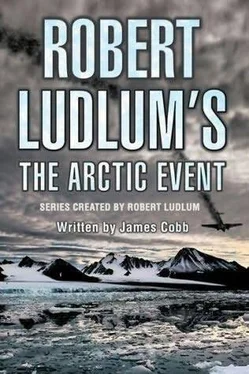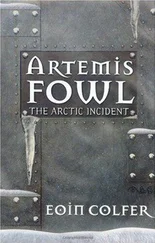“Only if they were using it. What if they were maintaining full EMCON, full emission control, with all of their radio and radar transmitters deliberately shut down to avoid detection?”
If such was conceivable, it seemed to grow colder. “So what do you think, Professor?” Smith asked.
“I don’t know what to think, Colonel,” she replied. “Or rather, I don’t know what I want to think. One thing I am certain of. Tomorrow morning we have got to find the crew of this plane. It might be more important in the greater scheme of things than the anthrax.”
“Do you think this might have something to do with this Russian alternate agenda?”
He saw her nod. “In all probability. I suspect when we find the survival camp, we’ll know.”
“I suspect we’ll know about Major Smyslov by then as well,” Smith replied grimly.
Out of the corner of his eye, Smyslov watched Smith disappear into the tail. All evening he had been waiting for the opportunity to act, for a moment when the others were involved or distracted. This might be the best, if not his only chance.
He headed for the crawlway tunnel leading forward, snaking down its length as rapidly and as quietly as he could. He knew exactly what he was to look for and exactly where it should be. He also had the set of fifty-year-old keys in his pocket.
Earlier in the day, when he had been in the cockpit with Smith and Metrace, he hadn’t dared to search. He couldn’t risk drawing possible attention to the Misha 124’s official documentation until he could ascertain its status.
Bellying into the forward compartment, he removed a pocket flash from his parka. Clenching it between his teeth, he sank down on one knee beside the navigator’s station and sent the narrow beam stabbing across the map safe below the table. Drawing the key ring, he fumbled with the safe’s lock.
This had been a Soviet Air Force bomber, and in the old Soviet Union, maps had been state secrets, denied to all but authorized personnel.
After a moment’s resistance the tumblers of the lock turned for the first time in half a century. Smyslov swung open the small, heavy door.
Nothing! The safe was empty. The navigational charts and the targeting templates that were to have been issued to the radar operator were gone.
Wasting no time, he closed and relocked the safe. The bomber’s logbook and the aircraft commander’s orders would be next. Moving forward to the left-hand pilot’s seat, Smyslov thrust the second key into the lock of the pilot’s safe located beneath it. Opening it, the Russian groped in the small, flat compartment. Again nothing!
That left the political officer’s safe. The most critical of the three. He squeezed in between the pilots’ stations to the bombardier’s position in the very nose of the aircraft. Here the glass of the unstepped greenhouse had been caved in by the crash, and snow had drifted in and had refrozen. The bombsight itself was gone-it hadn’t been needed for this mission-and the rest of the station was buried in caked semi-ice. Drawing his belt knife, Smyslov hacked his way down to the deck-mounted safe.
Damnation! The lock mechanism had been frozen solid. Swearing under his breath, the Russian tore off his gloves. Pulled his lighter from his pocket, he played the little jet of butane flame over the keyhole area. Burning his fingers, he muffled another curse and tried the key again. The stubborn lock yielded grudgingly.
Empty. The targeting photographs and maps. The tasking orders. The political officer’s log and contingency instructions and the crew’s postmission action plan-all were gone.
Smyslov resecured the safe door, repacking and smoothing the snow over it, trying to erase the signs of his tampering. Standing, he drew his gloves on again, his thoughts racing. It was all gone. All the mission documentation. That was how it was supposed to be. The Misha 124’s political officer had been ordered to destroy every last scrap of evidence concerning the bomber’s mission and the March Fifth Event.
But the political officer had also been ordered to destroy the aircraft and its payload. The thermite incendiary charges in the bomb bay were proof that he had been in the process of doing so when he had been interrupted. But what about the documents? Had he been prevented from destroying them as well?
And what of the men? Tomorrow Smith would go looking for the bomber’s crew. What would be left for him to find?
Smyslov tugged down the zip of his parka and restowed the pen flash. He also removed the cigarette lighter from his shirt pocket. Not the little plastic butane he had purchased at the airport shop in Anchorage, but the other one, the stainless steel Ronson-style reservoir lighter he had brought with him from Russia. Balancing it in his palm, his mind raced through his rapidly shrinking number of options.
He could comfort himself with the thought that much of the decision making had been taken out of his hands. If the Russian Spetznaz troopers had killed the science station’s personnel, fate must run its inevitable course. The coming confrontation between the United States and Russia would not be his responsibility.
He need only concern himself with betrayal on a far more personal level. Today he had saved the life of a friend in this strange cold metal room. Tomorrow he might have to kill that friend as an enemy. And the disclaimer that it wasn’t his fault rang hollow.
“Hey, Major, you okay up there?” Smith’s voice rang up the crawl tube from the aft compartment.
“Yes, Colonel,” Smyslov replied, his fingers tightening around the little silver box. “I only…dropped my cigarette lighter.”
Several hundred feet up the face of East Peak, on a ledge that overlooked both the glacier and the Misha crash site, the wide lens of a powerful spotting scope peered out through a crevice in an artfully camouflaged stone and snow windbreak. Two men lay behind the windbreak, sheltered by an ice-encrusted white tarp spread and supported over their heads. Even with the protection it was searingly cold on the exposed mountainside. Yet the two watchers stolidly endured, the one peering through the night-vision photomultiplier attached to the spotter scope, the other listening intently to the small radio receiver he had been issued.
At regular intervals the two men conducted a survival ritual, their free hands moving between their crotches and armpits and their faces, transferring body warmth to their exposed skin, keeping at bay the vicious, scarring frostbite.
Slithering on his belly like a lizard, a third parka-clad man crawled to join the two behind the windbreak.
“Anything to report, Corporal?”
“Nothing of importance, Lieutenant,” the man at the telescope grunted. “They have set up their camp inside the wreck. You can see lights through the windows of the rear compartment. Sometimes in the front as well.”
“Let me have a look,” Lieutenant Tomashenko said.
The Spetsnaz corporal rolled aside, making room for his platoon commander, and Tomashenko worked his way behind the night-vision scope, peering into the green and gray world it revealed. The bomber lay on the glacier below the observation post like a stranded whale. The faint wisp of illumination leaking from the downed plane’s astrodomes, all but undetectable to the naked eye, was magnified to a bright kelly glow by the photomultiplier. Intermittently the glow would pulse as a figure moved past the bubble windows.
“Apparently the anthrax spores are not loose inside of the airplane,” Tomashenko muttered. “That is something anyway.”
Tomashenko and his men had not ventured near the downed TU-4, nor had they even set foot on the glacier. The platoon’s orders were specific and stringent. Keep the crash site and the investigation team under long-range observation. Conceal their presence on the island. Avoid detection at all cost. Await the issuance of the alpha command by the point agent attached to the American party. Be positioned to intervene instantly on the transmission of said command. Be prepared to withdraw to the submarine should it not be issued.
Читать дальше












